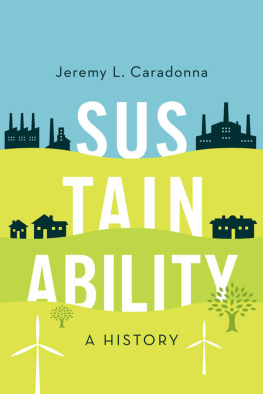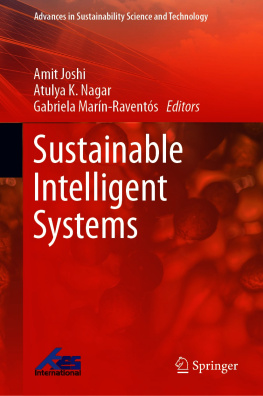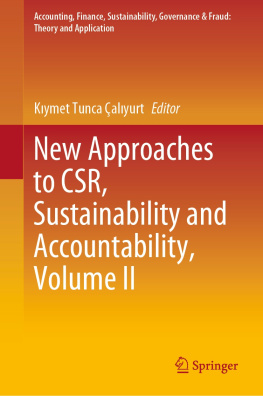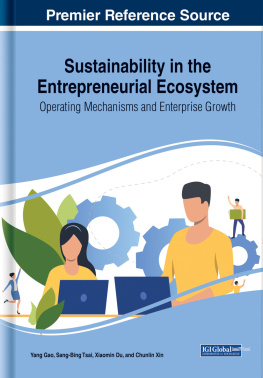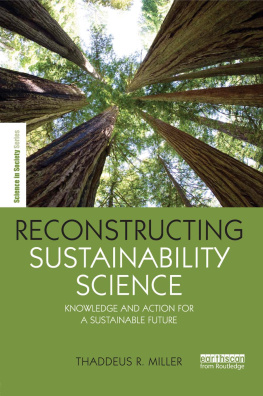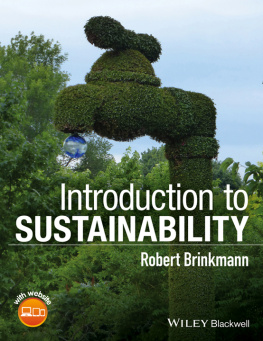
SUSTAINABILITY

Oxford University Press is a department of the University of Oxford.
It furthers the Universitys objective of excellence in research, scholarship, and education by publishing worldwide.
Oxford New York
Auckland Cape Town Dar es Salaam Hong Kong Karachi
Kuala Lumpur Madrid Melbourne Mexico City Nairobi
New Delhi Shanghai Taipei Toronto
With offices in
Argentina Austria Brazil Chile Czech Republic France Greece
Guatemala Hungary Italy Japan Poland Portugal Singapore
South Korea Switzerland Thailand Turkey Ukraine Vietnam
Oxford is a registered trade mark of Oxford University Press in the UK and certain other countries.
Published in the United States of America by
Oxford University Press 198 Madison Avenue, New York, NY 10016
Jeremy L. Caradonna 2014
All rights reserved. No part of this publication may be reproduced, stored in a retrieval system, or transmitted, in any form or by any means, without the prior permission in writing of Oxford University Press, or as expressly permitted by law, by license, or under terms agreed with the appropriate reproduction rights organization. Inquiries concerning reproduction outside the scope of the above should be sent to the Rights Department, Oxford University Press, at the address above.
You must not circulate this work in any other form and you must impose this same condition on any acquirer.
Library of Congress Cataloging-in-Publication Data
Caradonna, Jeremy L., 1979 Sustainability : a history / Jeremy L. Caradonna.
p. cm.
Includes bibliographical references and index.
ISBN 9780199372423
1. SustainabilityHistory. I. Title.
GE195.C379 2014
338.92709dc23 2013049859
1 3 5 7 9 8 6 4 2
Printed in the United States of America on acid-free paper
To the students of History 495 (History of Sustainability) at the University of Alberta, without whom this book could not have been written.

Thanks goes, first and foremost, to my wife, Hannah, for her love and tireless support. Our daughters, Stella and Mia, inspired every step of the research and writing of this book. I am hopeful that the world they leave behind one day will be more sustainable than the one they inherited. My parents and in-laws provided much-needed encouragement throughout the writing process. Tim Bent, Keely Latcham, and the entire Oxford University Press staff were a pleasure to work with; their guidance strengthened the manuscript immensely. The manuscript (or portions of it) was also read, critiqued, and improved by Andrew Gow, the participants in the European History Seminar at the University of Alberta, Jake Papineau, Lily Climenhaga, Mike Kennedy, and Emily Kennedy. My sincere thanks for all the useful feedback. Of course, any mistakes in the pages of this book belong entirely to me. Ive also benefited from discussions on sustainability with Ulrich Grober, Donald Worster, Chris Turner, David A. Bell, Kurt Rohrig, Paul Hawken, Nathan Perl-Rosenthal, Philippe Lucas, Mary Lucas, David Kahane, Cressida Hayes, Kris Hansen, Sarah Donald (ahem), Chloe Pope Durier, Fabrice Durier, Thomas Shields, Kate Lackey, Jim Fenton, Ali Cowan, James Cowan, John Nelson, Jody Nelon, Terry Power, Jessie Power, James Gwinnett, Wendy Hoglund, Sarah Blais, Alex Blais, Fiona Williams, James McFarland, Phil Bell, Marcia Bell, Sean Flynn, Eric Hall, Mike Spring. Special thanks to Stella, Mia, Sophie, Angus, Callum, Solomon, Esther, Milo Ignatius, Molly, Ana, Lily, Maya, Oliver, Bea, Sebastian, Hazel, Elliott, Francis, Linnaea, Sebastian, and all the wonderful little kids out there who make me hopeful for the future.
SUSTAINABILITY
We must aim for a continuous, resilient, and sustainable use [of forests]....
Hans Carl von Carlowitz, 1713
Sustainability is a lifestyle designed for permanence.
Chris Turner, 2010
As hard as it might be to believe, the world once made do without the words sustainable and sustainability. Today theyre nearly ubiquitous. At the grocery store we shop for sustainable foods that were produced, of course, from sustainable agriculture; ministries of natural resources in many parts of the world strive for sustainable yields in forestry; the United Nations (UN) has long touted sustainable development as a strategy for global stability; and woe be the city dweller who doesnt aim for a sustainable lifestyle.
Sustainability first emerged as an explicit social, environmental, and economic ideal in the late 1970s and 1980s. By the 1990s, it had become a familiar term in the world of policy wonkeryPresident Bill Clintons Council on Sustainable Development, for instancebut the embrace wasnt universal. Bill McKibben, perhaps the most prominent environmentalist of the past 30 years, wrote an opinion piece in the New York Times in 1996 in which he dismissed sustainability as a buzzless buzzword that was born partly in an effort to obfuscate and which would never catch on in mainstream society. In McKibbens view, sustainability never made the leap to lingoand never would. Its time to figure out why, and then figure out something else. (McKibben preferred the term maturity.) Many others have since accused sustainability and sustainable development of being superficial terms that mask ongoing environmental degradation and facilitate business-as-usual economic growth. Those are debatable points that will be discussed in this book. But one thing is clear: McKibben was quite wrong about the quick decline of sustainability.
One way to demonstrate this growing interest is to look at book titles that bear the word sustainable or sustainability. Its difficult to find books published before 1976 that employ these words as titles or even as keywords. shows, no book in the English language used either term in the title before 1970. But since 1980 there has been an explosion of books and articles that not only use those words as titles but also deal with the many facets of sustainability. Indeed, thousands of books make up this growing body of literature. Whats more, a quick Google search for sustainability returns around 150 million hits.
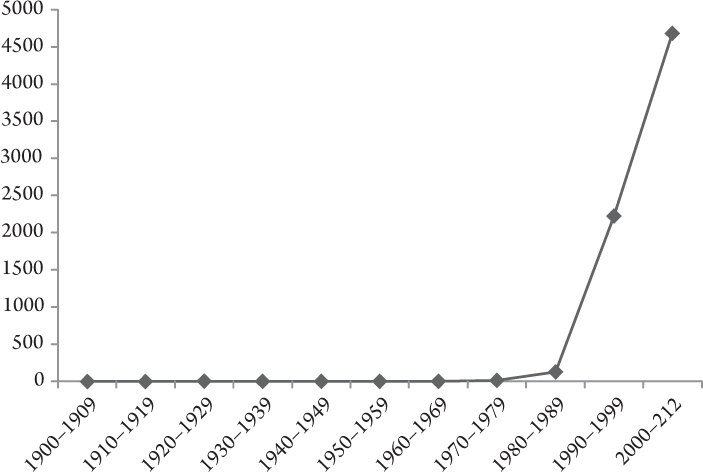
Figure 1. Books with the word sustainable or sustainability in the title, 19002012.
Is sustainability a buzzword? Absolutely. But is it also buzzless? Assuredly not. Governments, communities, organizations, and individuals all over the world have sought to align themselves with the basic principles of what they call sustainabilitya desire to create a society that is safe, stable, prosperous, and ecologically minded. The practices inspired by the concept of sustainability could give rise to the worlds third major socio-economic transformation, after the Agricultural Revolution that took place 10,000 years ago, and the Industrial Revolution(s) of the late eighteenth and nineteenth centuries. It is not only a buzzword but also a galvanizingly powerful term whose application subsumes a number of other movements, environmental perhaps most of all.
Sustainability is, first and foremost, used as a corrective, a counterbalance, and directly tied to climate change (a term that most governments would like to avoid). Those who use it argue that we are 250 years into an unsustainable ecological assault on the planet that was triggered by industrialization and that has left us with a lot of soul searching and cleaning up to do. Sustainability therefore is a way of acknowledging how humankind has created an imbalance. According to Jeffrey D. Sachs, we now live in the Age of the Anthropocene, in which human activity has become the dominant driver of the natural environment. We

